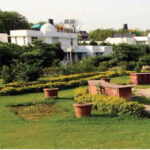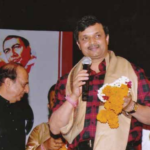- Cover Story
- Governance
- Globe Scan
- Corruption
- State Scan
- Talk Time
- Cover Story
- Governance
- Globe Scan
- Corruption
- State Scan
- Talk Time
Recent Posts
© Copyright 2007 - 2023 Gfiles India. All rights reserved powered by Creative Web INC.Book ReviewBook Review : Profiling a low-profile leader
Ashok MohanJune 6, 20143 Mins read522 Views
 Written by Ashok Mohan
Written by Ashok MohanAMIDST the recent avalanche of books on politicians of different hues, a very low-profile politician has also made the grade. A maiden biographical sketch of the BJP’s emerging hero, Shivraj Singh Chouhan, documents the rise of the low-profile leader and the simultaneous growth of Madhya Pradesh.
Shivraj Singh and Rise of Madhya Pradesh throws adequate light on how MP was administered in the backdrop of almost complete lack of measurable development during the 10-year Congress regime under Digvijaya Singh (1993-2003) and gives credit to Shivraj for its record growth of 18 per cent in the agriculture sector.
Written in story-telling fashion, the book, for the first time, brings on record many schemes and projects which have been started by MP and were later emulated by other states. The thrust of the author is on schemes likepanchayats organised by Shivraj at his home for various castes, genders and vocations to give them instant solutions. “In a panchayat, held soon after the Assembly polls of 2013 for the unorganised sector of car/bus and taxi drivers, Chief Minister Chouhan announced the setting up of a corpus fund of `10 crore to meet any eventuality like accidents and provide help to drivers from that fund,’’ Khandekar, now an editor with the Dainik Bhaskar Group after a long stint with The Hindustan Times, writes after attending the panchayat at the CM’s house in Bhopal.
The book quotes Shivraj as saying that he was committed to making agriculture a profitable business in 2006, and succeeded in doing that within five-six years as wheat and gram production was recorded to be the highest in the country. Madhya Pradesh bagged the Krishi Karman Award from the Government of India for two successive years—2013 and 2014. A separate Krishi Cabinet dealt with agro-issues and the state also brought down the interest rate to zero per cent, the first state to do so.
Last November saw the third straight victory of the BJP in the state, led by a farmer’s son Shivraj. Author Abhilash Khandekar, who himself hails from the Central Indian state has attempted to profile Shivraj as a leader committed to development through his unique style of good governance and non-conflicting approach to politics. On the face of it, Chouhan does not seem to be a shrewd politician but has managed to balance the factions within the BJP.
Politically suave, Shivraj also managed to keep an eye on his political detractors while developing the state. The book says, pointing to former chief minister Uma Bharti, that she was to come back as CM after Babulal Gaur was asked to quit in November 2005, but Shivraj foiled the bid, thanks to his mentor (late) Pramod Mahajan and other senior party leaders being in his favour. Since then Uma and Shivraj don’t really see eye-to-eye. Shivraj has been able to keep Uma confined to UP.
Though the author praises the persona of Shivraj in a limited manner, he does not focus on the controversies that the state has seen under Shivraj, who himself was caught in a case related to dumper hiring by a private company, JayPee Associates, in his early years as the CM.
The author paints the CM as being tough on corruption and bureaucracy, giving examples how two top bureaucrats—Chief Secretary Vijay Singh and DGP Swaraj Puri—were removed in just one stroke, though in different cases and at different times. On December 8, 2013, when he was sworn in as CM for the third time, he publicly announced his policy of “zero tolerance against corruption’’. Yet, the book does not take into account the unending corruption for which MP has hogged the limelight, off and on. The removal of Principal Secretaries Arvind Joshi and Tinoo Joshi, the IAS couple, after the seizure of huge amounts of cash from their Bhopal bungalow, does, however, get lengthy mention in the book.
Woven with contemporary politics, the book gives some rare insights into the affairs of Madhya Pradesh, a state which is not much talked about at the national level.
Recent Posts
Related Articles
Book ReviewA life in secret
Written by Abhilash Khandekar RAM Nath Kao (1918-2002) is not one of those...
ByAbhilash KhandekarMarch 4, 2020Book ReviewFrom behind the steel frame
Written by K. SUBRAMANIAN THE British East India Company came to this subcontinent...
ByK. SUBRAMANIANMay 8, 2019Book ReviewClassified reality
Written by Narendra Kumar IN the era of star whistleblowers such as Julian...
ByNarendra KumarJuly 16, 2018Book ReviewSpies who came in from the cold
Written by Shubhabrata Bhattacharya THE book, jointly authored by India’s former Indian Research...
ByShubhabrata BhattacharyaJune 20, 2018 - Governance
- Governance





























































